Georgia strives to strengthen the care economy and introduce gender-responsive family policies

The EU, Sweden and UN are launching a high-level discussion on systemic solutions supporting women’s economic empowerment in Georgia.
The United Nations, in partnership with the Government of Sweden and the European Union (EU), is supporting Georgia’s efforts to introduce key principles of the care economy and promote strategic solutions supporting women’s economic empowerment, equal employment opportunities and gender-responsive family policies.
The national vision of this life-changing transformation was discussed at a high-level conference, organised on 8 June by two UN agencies – the United Nations Development Programme (UNDP) and the United Nations Population Fund (UNFPA). The event was supported by the Sweden-funded UN Joint Programme for Gender Equality, implemented by three UN agencies (UNDP, UNFPA, UN Women), and the EU-funded programme “EU4GenderEquality: Together against gender stereotypes and gender-based violence”, implemented jointly by UN Women and UNFPA.
Chairperson of the Parliament’s Gender Equality Council Nino Tsilosani presented some main principles of the National Concept for Women’s Economic Empowerment, a strategic policy document being prepared by lawmakers.
Advisor to the Prime Minister on Human Rights Niko Tatulashvili stressed that gender-responsive family policies increase the participation of women in the labour market and open opportunities to fulfil their career aspirations, ensure gender balance and reduce discrimination. Besides, they support building a tolerant and non-discriminatory society and in combination with other factors, increase the birth rate and ensure demographic resilience.
This was followed by panel discussions focused on social and economic issues that a well-functioning care economy can address, including a high share of women in unpaid and low-paid care work, economic insecurity of caregivers, low participation of women in the labour market, unequal distribution of domestic chores between women and men, lack of access to quality childcare services, and low engagement of women in economic activities and politics.
Georgian officials announced concrete commitments aimed at enhancing care economy principles and introducing gender-responsive family policies while representatives of international organizations reconfirmed their support for Georgia’s efforts.
Speakers included Ambassador of Sweden to Georgia Ulrik Tideström, UN Resident Coordinator in Georgia Sabine Machl, UNDP Resident Representative in Georgia Nick Beresford, Head of UNFPA Georgia Office Lela Bakradze, Deputy Minister of IDPs from the Occupied Territories, Labour, Health and Social Affairs of Georgia Tamila Barkalaia and representatives of Georgia’s Government, Parliament, civil society, the private sector and international organizations.
“Women’s economic empowerment requires active measures to increase women’s access to and control over economic resources – including to secure a more equal sharing of family responsibilities between women and men. Sweden supports comprehensive economic equality reforms in Georgia, including efforts to address legal and societal inequalities that hinder women’s and marginalized groups’ access to resources.’’- H.E. Ulrik Tideström, Ambassador of Sweden to Georgia
“We support policies that help Georgia build an economy that responds to people’s needs. Good quality and affordable childcare, elderly care with dignity, paid family leave and workplace flexibility are building blocks of a society and an economy that works for all of us.”- Nick Beresford, UNDP Resident Representative in Georgia
“Evidence shows that gender-responsive family policies – both at the national level and those implemented by the private sector – are powerful tools to shift discriminatory gender norms and redistribute unpaid care work so that both men and women can realize their career aspirations and their fertility intentions. When women are forced to give up their careers to take care of children and the household, their talents and other contributions remain untapped in the economy and public life. And when women can’t have the number of children they want because that would in effect end their careers, the resulting low birth rates add further pressure on population numbers. The existence of the Gender-responsive Family Policies is, in fact, a wise solution to tackle the problem.” – Lela Bakradze, Head of UNFPA Georgia Office
Even though Georgia makes significant progress in reducing gender inequalities, there are still areas where discrimination, bias and deep-rooted social norms prevent women from being fully engaged in economic, social and political participation.
Only about 40 percent of Georgian women of working age participate in the formal labour market (GEOSTAT, 2020), largely due to the challenges they face in combining work and family obligations. According to the World Bank, the economic cost of this persisting issue is 11 percent of Georgia’s GDP.
The distribution of household work in Georgia is still starkly segregated by gender, with women doing family chores in overwhelming numbers. Three out of four respondents say that women always perform basic care duties (UNDP/UNFPA. 2020).
The new National Concept for Women’s Economic Empowerment addresses many of these unresolved issues, defines key national priorities and paves the way to better economic and family policies and greater equality for all.
Media contacts:
- Sophie Tchitchinadze, UNDP, +995 599 196907, sophie.tchitchinadze@undp.org
- Magda Nowakowska, UNDP, +995 598 822544, magdalena.nowakowska@undp.org
- Salome Benidze, UNFPA, +995 577 211300, benidze@unfpa.org